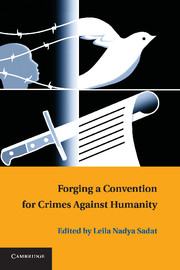Book contents
- Frontmatter
- Contents
- Figures and Maps
- Crimes Against Humanity Initiative: Steering Committee
- Biographies of Contributors
- Foreword
- Preface and Acknowledgments
- Crimes Against Humanity and the Responsibility to Protect
- 1 History of Efforts to Codify Crimes Against Humanity
- 2 The Universal Repression of Crimes Against Humanity before National Jurisdictions
- 3 Revisiting the Architecture of Crimes Against Humanity
- 4 The Bright Red Thread
- 5 Gender-Based Crimes Against Humanity
- 6 “Chapeau Elements” of Crimes Against Humanity in the Jurisprudence of the UN Ad Hoc Tribunals
- 7 The Definition of Crimes Against Humanity and the Question of a “Policy” Element
- 8 Ethnic Cleansing as Euphemism, Metaphor, Criminology, and Law
- 9 Immunities and Amnesties
- 10 Modes of Participation
- 11 Terrorism and Crimes Against Humanity
- 12 Crimes Against Humanity and the International Criminal Court
- 13 Crimes Against Humanity and the Responsibility to Protect
- 14 Re-enforcing Enforcement in a Specialized Convention on Crimes Against Humanity
- 15 Why the World Needs an International Convention on Crimes Against Humanity
- Appendices
- Testimonials and Endorsements
- Index
- References
1 - History of Efforts to Codify Crimes Against Humanity
From the Charter of Nuremberg to the Statute of Rome
Published online by Cambridge University Press: 01 June 2011
- Frontmatter
- Contents
- Figures and Maps
- Crimes Against Humanity Initiative: Steering Committee
- Biographies of Contributors
- Foreword
- Preface and Acknowledgments
- Crimes Against Humanity and the Responsibility to Protect
- 1 History of Efforts to Codify Crimes Against Humanity
- 2 The Universal Repression of Crimes Against Humanity before National Jurisdictions
- 3 Revisiting the Architecture of Crimes Against Humanity
- 4 The Bright Red Thread
- 5 Gender-Based Crimes Against Humanity
- 6 “Chapeau Elements” of Crimes Against Humanity in the Jurisprudence of the UN Ad Hoc Tribunals
- 7 The Definition of Crimes Against Humanity and the Question of a “Policy” Element
- 8 Ethnic Cleansing as Euphemism, Metaphor, Criminology, and Law
- 9 Immunities and Amnesties
- 10 Modes of Participation
- 11 Terrorism and Crimes Against Humanity
- 12 Crimes Against Humanity and the International Criminal Court
- 13 Crimes Against Humanity and the Responsibility to Protect
- 14 Re-enforcing Enforcement in a Specialized Convention on Crimes Against Humanity
- 15 Why the World Needs an International Convention on Crimes Against Humanity
- Appendices
- Testimonials and Endorsements
- Index
- References
Summary
THE NUREMBERG CHARTER
The modern usage of the words “crimes against humanity” dates from the Nuremberg Charter, article 6(c) of which reads as follows:
CRIMES AGAINST HUMANITY: namely, murder, extermination, enslavement, deportation or other inhumane acts committed against any civilian population, before or during the war, or persecutions on political, racial or religious grounds in execution of or in connection with any crime within the jurisdiction of the Tribunal, whether or not in violation of the domestic law of the country where perpetrated.
I doubt very much that the drafters of the Nuremberg Charter who gathered in London from June 26 to August 8, 1945 saw themselves as engaged in a codification exercise. In retrospect, the characterization is perhaps not inappropriate, although the term “crimes against humanity,” which provided a catchy title in the Charter to go along with “crime against peace” and “war crimes,” did not make an appearance in the drafting until the very last moment. Until then, the talk had been of “atrocities,” “persecutions,” and sometimes “deportations” (it apparently being understood that these were for the purpose of slave labor).
Probably the closest example of usage hinting at what would be “codified” in London was in the declaration of May 28, 1915 by the Governments of France, Great Britain, and Russia concerning the massacres of the Armenian population in Turkey, killings to which the term “genocide” has also since been applied.
- Type
- Chapter
- Information
- Forging a Convention for Crimes against Humanity , pp. 8 - 27Publisher: Cambridge University PressPrint publication year: 2011
References
- 3
- Cited by



